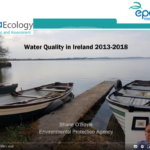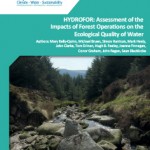The EPA report Water Quality In Ireland 2013-2018 was originally…
Research on Ireland’s water governance arrangements
The EPA has published two EPA Research Reports arising from the EPA-IPA Research Programme on the topic of Ireland’s water governance arrangements.
Research 372: Using the OECD Water Governance Indicator Framework to review the implementation of the River Basin Management Plan for Ireland 2018–2021
This report assesses water governance in Ireland using the Water Governance Indicator Framework, a tool developed by the Organisation for Economic Cooperation and Development (OECD) in 2018 to assist countries in assessing their progress towards the European Union’s Water Framework Directive. The report puts a particular emphasis on informing policy and practice in Ireland with a view to ensuring that governance arrangements are enhanced in the third-cycle River Basin Management Plan (RBMP) for Ireland 2022–2027.
Executive Summary:
The OECD Water Governance Indicator Framework was developed in 2018 to support the implementation of the OECD Water Governance Principles. The Water Governance Indicator Framework is conceived as a voluntary, self-assessment tool for examining national water governance policy frameworks. As noted in the introduction to the Water Governance Indicator Framework, its primary objective is to stimulate a transparent, neutral, open, inclusive and forward-looking dialogue across stakeholders on what does and does not work, what should be improved and who can do what. This study finds that the new governance structures put in place under the second-cycle RBMP go a significant way towards achieving the objectives contained in the Water Governance Indicator Framework. There is considerable reassurance for those involved that the structures put in place in Ireland around water governance are appropriate and that there are no significant gaps or omissions. Having said that, there is scope for improvements in Irish water governance arrangements for each of the principles. The key conclusions identified for each principle are set out in this report, with Ireland’s performance in each principle categorised as “strong progress”, “good progress” or “limited progress”.
Authors: Joanna O’Riordan, Richard Boyle, Fergal O’Leary and Laura Shannon
Research 373: Using an experimental governance lens to examine governance of the River Basin Management Plan for Ireland 2018–2021
This report examines lessons learned from the water governance arrangements put in place for the River Basin Management Plan (RBMP) 2018–2021 for Ireland through the lens of experimental governance. The study finds that the three-tier governance structure is appropriate and should be continued. However, there is still room for improvement in the area of adapting and improving the operation of the existing arrangements.
Executive Summary:
This report examines lessons learned from the water governance arrangements put in place for the River Basin Management Plan (RBMP) 2018–2021 for Ireland through the lens of experimental governance. Experimental governance is a phrase coined by academics to describe a system of governance that is open to change based on the practical lessons learned through implementation. It is particularly suited to help address so-called wicked problems, which comprise challenges such as climate change and water management. A particular emphasis is put on informing policy and practice with regard to ensuring that appropriate and effective governance arrangements are made in Ireland for the third-cycle RBMP 2022–2027. The governance system examined is based on a three-tier structure:
- a Water Policy Advisory Committee and the Water Forum (An Fóram Uisce) advising the Minister for Housing, Local Government and Heritage;
- a layer of technical support provided by the National Coordination and Management Committee, the Environmental Protection Agency and the National Technical Implementation Group; and
- local authorities, supported by regional committees and a local government shared service, the Local Authority Waters Programme (LAWPRO), involved in implementation.
The study finds that the three-tier governance structure put in place to support the implementation of the RBMP is appropriate and should be continued. Rather than radical changes to the governance structure for the next RBMP, it is more a case of adapting and improving the operation of the existing arrangements. The three-tier structure represents a significant innovation and improvement over the governance arrangements in place for the first-cycle RBMP. Recommendations for further improvements are made in the report.
Link to the Report:
Authors: Richard Boyle, Joanna O’Riordan, Fergal O’Leary and Laura Shannon
IPA Research Vignette: An Fóram Uisce (The Water Forum) as an example of stakeholder engagement in governance
This report addresses one aspect of stakeholder engagement: how to formally engage stakeholders in policy deliberation and formulation at the national level. The case examined is that of An Fóram Uisce (the Water Forum). The report summarises the findings from a range of interviews carried out in June and July 2020 as part of a wider research study funded by the Environmental Protection Agency (EPA) into water governance arrangements associated with the River Basin Management Plan for Ireland 2018–2021 (Boyle et al., 2021). Fifteen of these interviews were carried out with An Fóram Uisce (12 interviews with members and three interviews with the executive), and these provide the main data source for the report.
Link to the report: https://www.ipa.ie/_fileUpload/Documents/EPAIPA%20Water%20Forum%20Report%20Web.pdf







